Most people who are considering dental implants have a lot of questions. Since every patient has different needs, the best way to have your questions answered is to schedule a consultation with your dentist, or a specialist, who can evaluate your individual situation and give you specific recommendations.
We realize that many people are more comfortable gathering as much information as possible prior to scheduling a consultation appointment. So we asked some of the experts who are featured on this website to answer the questions they hear most often from patients considering dental implants.
Are Dental Implants Better Than Other Tooth Replacement Options?
Dr. Stephen Wheeler, a Board Certified Oral Surgeon in Encinitas, California is considered one of the leading experts in the field of implant dentistry and has placed thousands of implants for patients throughout the San Diego area. Having lectured extensively on the advantages of dental implants compared to other treatment options, Dr. Wheeler’s recommendation to patients is to preserve the bone whenever possible. This can only be accomplished with dental implants. No other treatment option replaces the tooth roots, preventing the bone deterioration that occurs when teeth are missing.
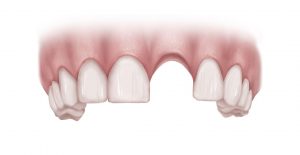
Single missing anterior tooth
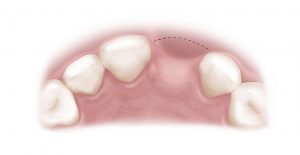
Bone melts away where tooth is
missing, leaving a visible defect
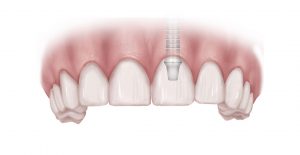
Dental implant crown replaces
the tooth and preserves the bone
In addition to preserving bone, Dr. Wheeler advises his patients to consider the importance of maintaining the long-term health of the surrounding teeth. For instance, it is necessary to grind down the teeth on either side of a missing tooth in order to place a bridge and this often leads to problems in the future that require additional treatment. Whereas, with a dental implant and crown, a one-tooth problem remains a one-tooth problem, since the adjacent teeth are not impacted.
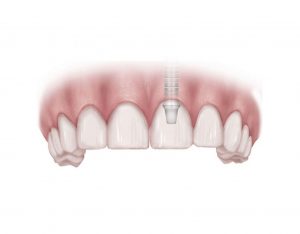
An implant and crown replace the missing
tooth without compromising other teeth
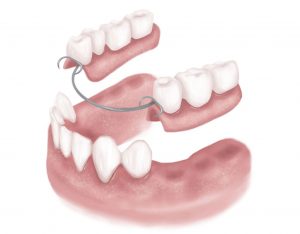
A partial denture hooks onto the adjacent teeth
for support, loosening them over time.
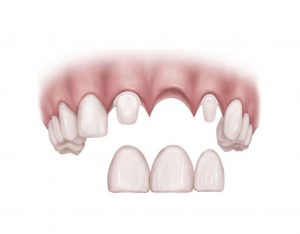
Replacing a tooth with a bridge requires
cutting down the two adjacent teeth.
Citing the evidence in scientific literature, Dr. Wheeler also emphasizes the long-term success rates of dental implants, which are much higher than other treatment options for tooth replacement. All in all, the combination of preserving bone and surrounding teeth and the high success rates, result in dental implant treatment being the most cost effective option for most patients.
For more information about why dental implants are the preferred treatment option for tooth replacement, refer to the Why Dental Implants section
Are Dental Implants Affordable Compared To Other Options?
Many people with missing teeth and those facing impending tooth loss have concerns about whether quality dental implant treatment is affordable.
The truth about the affordability of dental implants is simple. If an experienced surgical specialist places the implants and an experienced dentist or specialist restores the implants (designs and creates the replacement teeth with a dental lab) the success rates are extremely high compared to other treatment options, which require additional dentistry over time, increasing the overall cost. This makes dental implant treatment the most cost effective option over the long haul.
On the other hand, if implants are not placed by an experienced surgical specialist and are not restored by an experienced dentist or specialist, it is possible for problems to arise that must be addressed, and this increases the cost of treatment substantially.
The cost of future additional dentistry should be taken into consideration when comparing the affordability of dental implants compared to tooth-supported bridges, partials and dentures, which do not have the same high, long-term success rates as dental implant treatment. Therefore, additional dentistry is needed over the years to repair or replace them.
For example, sometimes the teeth supporting bridges decay under the bridge ad require root canal therapy. Partial dentures can loosen the teeth that support them and even result in tooth loss over time. Partials also accelerate bone resorption, which affects the functionality and fit of the partial, requiring relining and eventually replacing the prostheses.
Let’s look at a specific situation – the loss of an anterior (front) tooth – so that we can compare the actual fees for alternative treatment options. One option is the tooth-supported bridge, another option is a single implant and crown. Since the average life span of a bridge is 10 years the odds are that the bridge will need to be replaced in 10 years and again 10 years later. Whereas, an implant crown is 97-98% over 20+ years and will probably not need to be replaced.
The chart below shows a cost comparison for a bridge and an implant crown over a 20-year period of time.
Where Can I Find The Lowest Cost Dental Implants?
Dental implants are not a commodity. All dental implants are not the same. There are several factors that determine the fees for treatment, not simply the cost a doctor pays for a dental implant. Most surgical specialists use high quality dental implants and as such, the fees for implant treatment in a surgeon’s office are often higher than fees for advertised bargain implants.
In addition, Oral Surgeons and Periodontists typically perform surgical procedures in a surgery suite equipped with the most advanced technology and staffed with highly skilled assistants. But more importantly, surgical specialists have had extensive training in surgical procedures and managing potential complications. Their fees are rarely the lowest in the area, but they generally provide the highest quality treatment and the safest environment for surgery.
You should be wary of advertised fees that seem especially low, as these fees are often based on low quality implants and materials, cutting corners with treatment or lab procedures, or the inexperience and lack of training of the dentist providing treatment. There is no comparison to the quality and exceptional treatment outcomes provided by experienced surgical specialists. In short, if it sounds too good to be true, it probably is.
Unfortunately, Board Certified Oral Surgeons like Dr. Albert Lin and Dr. Robert Gramins in Poway, California have seen too many cases where patients received bargain implants and subsequently experienced problems. In these cases, the patient’s treatment often has to be completely redone at a significant cost. One patient’s story about her failed bargain implant treatment was featured on KGTV News in San Diego.
Who Is Qualified to Place Dental Implants?
Most dentists will refer their patients to surgical specialists for surgical procedures because of the extensive training and experience they have performing surgery and managing complications. Surgical specialists have had years of postgraduate surgical residency training, which provided them with extensive experience anticipating, diagnosing and managing surgical complications. In addition, they perform surgical procedures on a daily basis, giving them a tremendous amount of experience with all types of situations.
Any dentist can legally place dental implants, and there are thousands of general dentists across the country placing implants, rather than referring patients to surgical specialists. Some dentists have had extensive training and experience with surgical implant placement, however, many dentists have had very little surgical training.
Unfortunately, patients are largely unaware of the risks associated with having an inexperienced dentist perform surgical procedures, such as infections, bone graft failures, and other adverse outcomes. As Dr. Albert Lin, a Board Certified Oral Surgeon in Poway, California explained for KGTV News in San Diego, by not seeing someone who is qualified to place dental implants, you are taking a serious risk with your dental health and the final cost often exceeds the initial investment of going to someone who is qualified to place implants.
For more information on who is qualified to place dental implants, refer to the following sections:
Experts in Dental Implants: Boulder Oral & Maxillofacial Surgery
Boulder Oral & Maxillofacial Surgery is located in Poway, California and is known for the exceptional care and personalized service the surgeons and their professional staff provide for patients. Dr. Lin and Dr. Gramins are Board Certified Oral and Maxillofacial Surgeons with extensive experience providing surgical implant procedures, including bone grafting and sinus lifts.
The doctors have placed thousands of dental implants for patients throughout San Diego County and their expertise and commitment to excellent treatment outcomes has earned the respect of colleagues throughout the region. The practice has also been featured on KGTV News in San Diego, which has reported extensively on the consequences of not selecting doctors who are highly trained and skilled with surgical dental implant procedures. Learn more about Dr. Lin, Dr. Gramins and their practice in Poway here.
Are Dental Implants Covered By Dental Insurance?
Every patient with dental insurance wants to maximize their benefits and it can be extremely frustrating trying to understand the seemingly endless lists of restrictions that affect each individual plan. This seems to be particularly difficult with dental implants. Many plans do not cover dental implants. Some plans only cover portions of the implant treatment needed. There is no answer to this question that applies generically to dental insurance. To obtain accurate information about your plan, you will need to contact your insurance company.
However, there are important guidelines that apply to nearly all plans. For instance, dental insurance plans are designed to cover annual maintenance (cleanings), basic care and occasional emergencies. The specific procedures covered and the benefits paid for procedures are determined solely by the amount that was paid for the plan. The covered procedures are usually those most commonly utilized by the majority of the people on the plan. Therefore, it is not uncommon to exclude treatment such as dental implants or orthodontic care.
Also, with rare exceptions, there is an annual maximum for every plan – a limited total amount that will be paid out for your dental care in a one-year period. The maximum is usually $1,000 to $1,500. Regardless of how extensive your dental needs are and the amount of treatment required, the insurance company will not pay more than this maximum in a year. There are no exceptions. In reality, it more like a gift card for a set amount than actual insurance, which is designed to insure against significant future treatment needs and costs.
The bottom line is that if you have insurance that covers dental implants, you should assume for planning purposes, that you will receive a maximum of $1,000 to $1,500 toward the total fee for your dental implant treatment.
How Much Do Dental Implants Cost?
Of course, everyone wants to know what their particular treatment will cost, and although this will vary from patient to patient, we want to give you some general information about the cost of dental implants. This is a bit complicated, as there are so many different factors involved in determining the cost of each patient’s treatment.
Some of the factors that determine the total cost of implant treatment, include:
- Diagnostic 3D imaging
- Number of implants needed
- Type/brand of implants being placed
- If necessary, the type and amount of bone grafting
- Patient’s preference for anesthesia/sedation
- Number and type of crowns
- Type of prosthesis for complete tooth replacement
- Custom components for fabricating the replacement crowns
- Complexity of lab work (framework, replacement crowns and bridges, etc.)
Typically, there are three phases of treatment with fees for each of these phases: 1) Diagnosis, evaluation and treatment planning, 2) Surgical procedures (implant placement, removal of teeth, bone grafting), and 3) Restorative procedures (design and fabrication of replacement teeth).
Fees For Diagnosis, Evaluation and Treatment Planning
The first phase of treatment is the diagnostic, evaluation and treatment-planning phase. This usually begins with an examination by your dentist to determine your treatment options. Your dentist will most likely want to take a panoramic x-ray as part of the examination.
Assuming you are a candidate for dental implant treatment, your dentist will refer you to a surgical specialist, who will use 3D imaging to evaluate the available bone for implant placement, the angle for implant placement, and the exact location of critical anatomical structures, such as the nerves and sinuses, in relation to the ideal site for the implants. This 3D imaging has become standard of care and is critically important for the safest and most precise surgical placement of dental implants.
Most dentists and surgeons charge a fee for the comprehensive evaluation and consultation, although some do not. There is generally a fee for the 3D imaging and other diagnostic x-rays. Generally, you can expect to pay somewhere between a few hundred and several hundred dollars for the following services:
- Initial Exam with Dentist
- Exam, Evaluation and Consultation with Surgical Specialist
- Panoramic X-ray
- 3D CT Scan
- Models of Your Teeth
Fees For Surgical Procedures
This phase of treatment involves the surgical removal of any teeth that need to be replaced, preparation of the site where the implants are to be placed and the surgical placement of the dental implants. Since dental implants are medical devices that are implanted in the bone, the quality of the implants and the experience of the surgical specialist should be the most important considerations.
If teeth need to be removed as part of the treatment plan, it is better to have a surgical specialist remove the teeth. Surgical specialists use special techniques to preserve bone when they remove teeth, which is important for placement of the dental implants. Also, if you are having multiple teeth removed, you might be more comfortable being sedated.
If you have lost bone, or have a defect in the bone, and need to have bone added to the implant site, the surgical specialist will recommend a bone grafting procedure. The type, quality, and amount of bone grafting material necessary for your individual situation will determine the fee for this procedure.
The fees associated with the actual implant placement surgery are determined by the quality of the dental implants and other implant components, as well as the difficulty placing the implants and whether bone grafting is done at the same time. Some patients will also choose to be sedated for surgery and there is an additional fee for anesthesia in these cases.
The best surgical specialists use high quality dental implants, components and bone grafting material, as well as leading edge technology. Their fees reflect the level of quality patient care they provide. If you need to have a single tooth replaced, the fee for surgical placement of the dental implant without bone grafting or anesthesia could be approximately $2,000 to $2,500 (estimates vary geographically). This does not include the fee for crown and the fee would be higher if you need the following services:
- Surgical Tooth Removal
- Bone Grafting
- Anesthesia/Sedation
If you are missing multiple teeth, it is much more difficult to give you even general fee information because of the numerous variables. Although you will not necessarily need one dental implant for each missing tooth, the number of teeth being replaced and the type of prosthesis necessary will determine the final fee.
Fees For Restorative Procedures
Fees vary considerably for the restorative procedures; the design, fabrication, and placement of the replacement tooth/teeth. This is true even with a single implant crown, which can have a higher fee in the anterior (front of the mouth) where the esthetics outcome is critical and custom components might be necessary. Generally speaking, a single crown can be anywhere from $1,500 to $3,000, depending upon a number of factors, such as custom components and complexity of the lab work necessary to obtain the ideal esthetic results.
It is virtually impossible to provide general fee information for patients who are replacing all of their teeth in one or both arches, because there are so many types of restorative solutions. For instance, a removable lower denture can be secured in place with special attachments and just two implants. Whereas, some patients choose to have a full set of fixed, non-removable porcelain replacement teeth secured to six or eight implants in one arch (upper or lower).
If you are planning to have all of your teeth replaced, it is best to consult with a prosthodontist, a specialist in tooth replacement, or an experienced dentist with advanced training in restorative implant dentistry. This is really the only way that you will be able to find out which type of replacement teeth will best meet your needs.
The list below includes just a few of the possible options for patients who need to replace all of their teeth in one or both arches.
- Overdenture that attaches to two or more implants (removable)
- All-on-4 ® acrylic prosthesis secured to four implants per arch
- Hybrid prosthesis secured to five or six implants per arch
- Fixed porcelain bridge secured to six to eight implants per arch
You can find more information on treatment options for complete tooth replacement in the Treatment Options Section.